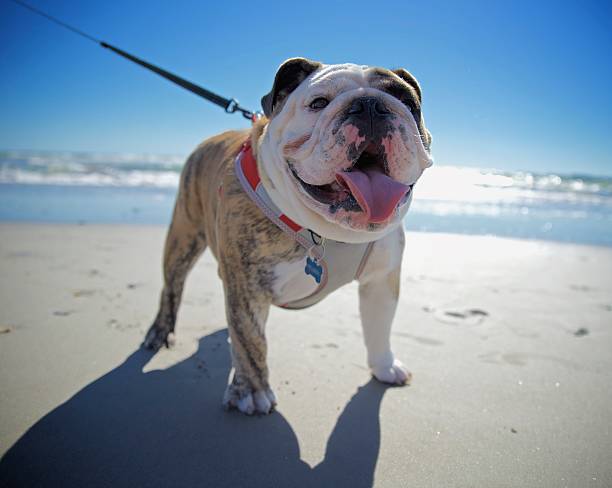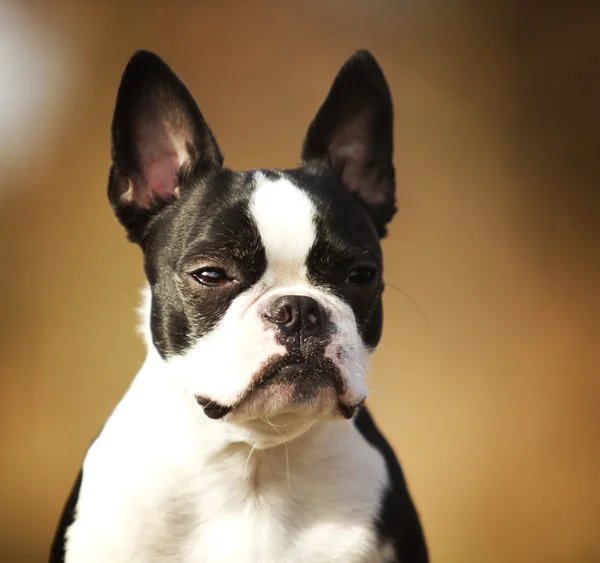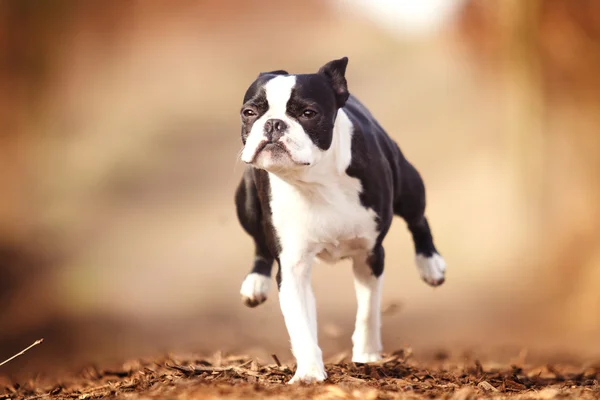The Boston Bulldog, also known as the Boston Terrier, is a delightful blend of charm and intelligence that captures the hearts of dog enthusiasts and families seeking a friendly companion. With its tuxedo-like markings, friendly personality, and remarkable adaptability, this breed has carved out a treasured niche as both a beloved family member and a symbol of American charm.

| Category (Explanation) | Breed Information |
|---|---|
| Year of Breed Conception | 19th century |
| Country of Origin | United States |
| Weight (Male) | 12-25 lbs (5.5-11.5 kg) |
| Weight (Female) | 10-20 lbs (4.5-9 kg) |
| Coat Type | Short, fine |
| Color Variations | Brindle, seal, black with white |
| Shedding Level | Low |
| Height (cm & in) | 15-17 inches (38-43 cm) |
| Breed Size | Small |
| Trainability | High |
| Mental Needs | Low |
| Intelligence Level | High |
| Energy Level | Moderate |
| Agility | Moderate |
| Loyalty | High |
| Playfulness | High |
| Exercise Needs | Regular exercise and play |
| Guarding Proficiency | Low |
| Sociability with Children | High |
| Barking Level | Low to moderate |
| Digging Tendency | Low |
| Destructive Behavior | Low |
| Drooling Level | Low |
| Obedience Level | High |
| Apartment Friendly | Yes, excellent for apartment living |
| Inherent Prey Drive | Low |
| Physical Risk to Others | Low |
| Travel Fatality Risk | Low |
| Allergen Potential | Low |
| Health Concerns | Brachycephalic syndrome, allergies |
| Average Life Expectancy | 11-13 years |










































































Woof Mastery is reader supported and our articles may contain affiliate links.
Instead of running third party ads that we have no control of we only use links from high-quality companies we are directly partnered with. Making use of these links come at no cost to you our reader, and in many cases have the extra benefit of discounted rates or sign up bonuses.
If you’re interested you can read more about our affiliate policy here.
We appreciate your support and always insure that the products and services we recommend are high-quality, helpful and relevant to the subject at hand!
The Boston Bulldog, also known as the Boston Terrier, has a history that weaves together American and British influences. Bred in the late 19th century in the United States, they are a crossbreed between the now-extinct English Bulldog and the White English Terrier.
Initially bred for fighting, they were later refined into charming and friendly companions. The breed’s transition from a fighting past to becoming beloved family members showcases their adaptability and amiable disposition.
Today, Boston Bulldogs are celebrated for their friendly nature, distinctive tuxedo-like markings, and their unique status as “American Gentlemen,” embodying the charm and grace of their historical lineage.

What sets the Boston Bulldog, also known as the Boston Terrier, apart is its unmistakable tuxedo-like markings and friendly personality. These dogs are known for their charming appearance and sociable nature. Boston Bulldogs are special for their adaptability, thriving in various living environments, from city apartments to suburban homes.
Their distinctive look and friendly disposition make the Boston Bulldog truly special, often referred to as “American Gentlemen” for their unique appearance and amiable personality.
Their traditional role has always been as loving companions and small, friendly family dogs.
Boston Bulldogs, also known as Boston Terriers, are renowned for being friendly and sociable dogs. They have a charming and affectionate disposition, making them great companions. Their intelligence and eagerness to please make them trainable, and they are known for their loving and dependable nature. These dogs are known for their playful and spirited personalities.
They enjoy engaging in games and activities with their families and are often seen as cheerful and lively companions. Boston Bulldogs form strong bonds with their owners and are highly responsive to positive interactions.
Their expressive faces, complete with tuxedo-like markings, add to their endearing charm. They thrive on being part of the family and actively participate in various activities, from playtime to cuddles on the couch. Boston Bulldogs embody the perfect balance of spunk and affection, making them delightful additions to any household.
Boston Terriers, often referred to as Boston Bulldogs, are celebrated for their friendly, affectionate, and adaptable nature. They are known for forming strong bonds with their families and often showcase sociable and friendly behavior towards strangers. While they may have mild protective instincts, training can effectively address any occasional stubbornness.
Due to their smaller size, leash training is typically less challenging. Boston Terriers are generally easygoing and adaptable to various living situations. Their playful and amiable disposition adds to their reputation as delightful companions, suitable for both individuals and families.
Boston Bulldogs, also known as Boston Terriers, are small and compact dogs celebrated for their charming and tuxedo-like appearance. They possess a square-shaped head with a well-defined jaw and expressive round eyes.
Their eyes are typically dark, conveying intelligence and a friendly disposition. Ears are small and stand erect, adding to their endearing look.
These dogs have a short, smooth coat that comes in a distinctive tuxedo pattern, typically with black and white markings. This coat not only enhances their well-proportioned and balanced physique but also complements their friendly and cheerful nature.
Boston Bulldogs possess a muscular neck, leading to a broad chest and sturdy, straight legs. Their tail is typically short and may be docked.
In terms of size, males and females both stand around 15 to 17 inches (38-43 cm) at the shoulder, and their weight typically ranges from 12 to 25 pounds (5-11 kg).
Overall, the Boston Bulldog epitomizes a delightful blend of charm, playfulness, and adaptability. Their appearance exudes a compact and friendly demeanor, making them a beloved choice for families seeking a lovable and lively pet, whether in bustling cities or tranquil suburban settings.
Boston Bulldogs, also known as Boston Terriers, have a distinctive tuxedo-like appearance with the following color varieties:
Boston Bulldogs, also known as Boston Terriers, have a low shedding level. They are not heavy shedders, and their shedding is typically minimal year-round. Occasional grooming and brushing with a soft bristle brush can help control shedding and keep their coat looking its best.
Factors that can affect shedding in Boston Bulldogs can be influenced by genetics and skin health. Maintaining proper skin care and addressing any dermatological issues can help minimize shedding. A balanced diet rich in essential nutrients is important for overall coat health.
Boston Bulldogs, also known as Boston Terriers, have short, smooth coats that are easy to care for.
Brushing: Regular brushing once or twice a week helps minimize shedding and maintains coat health.
Bathing: Bathe them only when necessary, as their skin is sensitive. Use a mild dog shampoo and ensure thorough rinsing and drying.
Ears: Clean their ears regularly to prevent wax buildup or infections. Use a damp cotton ball or a veterinarian-recommended ear cleaning solution.
Nails: Keep their nails trimmed to a comfortable length to prevent discomfort.
Teeth: Brush their teeth regularly to maintain good oral hygiene and prevent dental issues. Dental chews or toys can help with oral care.
Eye Care: Watch for signs of eye irritation or discharge and clean around the eyes if necessary with a damp cloth.
Boston Bulldogs, also known as Boston Terriers, have a moderate activity level. They are known for their friendly and lively personality. Here are some key points to consider about their activity level:
Boston Bulldogs, also known as Boston Terriers, possess a moderate level of intelligence, which complements their charming and affectionate nature. Their intelligence is reflected in several aspects:
While Boston Bulldogs, also known as Boston Terriers, may not be at the forefront of problem-solving or obedience competitions, their intelligence, combined with their loyalty and protective instincts, makes them dependable family pets and guardians. They are known for their unwavering commitment to their loved ones, always ready to provide support and protection. Proper training and socialization are essential for their well-rounded behavior.
Boston Bulldogs, with their lively nature, enjoy activities like puzzle toys, training challenges, or interactive play sessions.
Social Interaction: They are affectionate and sociable, requiring consistent interaction with their families to remain happy and content.
Exercise: Regular walks or indoor play sessions keep their minds active and their spirits high.
Training and Obedience: Engaging in regular training sessions using positive reinforcement techniques helps in managing their energetic nature. Routine and Structure: Maintaining a set daily routine provides a sense of security and comfort to the Boston Bulldog.
Affection and Attention: They love being the center of attention and thrive when showered with love and affection by their families.
Socialization: Introducing them early to different environments and beings ensures they grow up as friendly and confident pets.
Safe Environment: Providing a cozy and secure space at home is crucial for them to relax and feel protected.
Consistency: Adherence to a regular schedule and training approach helps in ensuring they remain well-adjusted and content.
Enter The Woof Mastery

Before bringing a Boston Bulldog (Boston Terrier) into your home, it’s crucial to understand their needs. These dogs are known for their friendly and lively personalities. They require moderate exercise and mental stimulation to stay happy. Training is important to ensure they are well-behaved. Health concerns, like respiratory issues due to their flat faces, should be monitored.
Responsible ownership involves being prepared for potential health issues and veterinary expenses. Provide love, attention, and a comfortable living environment to keep these affectionate and playful companions content.
Boston Bulldog or Boston Terriers, with their friendly disposition, have the potential to pose a physical danger if they aren’t adequately socialized, trained, or managed. Behavior reflects factors like temperament, upbringing, training, and owner dedication. Here’s their potential danger analysis:
Boston Bulldogs, also known as Boston Terriers, are renowned for being friendly and sociable dogs. They have a charming and affectionate disposition, making them great companions. Their intelligence and eagerness to please make them trainable, and they are known for their loving and dependable nature. These dogs are known for their playful and spirited personalities.
They enjoy engaging in games and activities with their families and are often seen as cheerful and lively companions. Boston Bulldogs form strong bonds with their owners and are highly responsive to positive interactions.
Their expressive faces, complete with tuxedo-like markings, add to their endearing charm. They thrive on being part of the family and actively participate in various activities, from playtime to cuddles on the couch. Boston Bulldogs embody the perfect balance of spunk and affection, making them delightful additions to any household.
Boston Bulldog or Boston Terriers, with their lively demeanor and distinct tuxedo-like markings, have a set of attributes affecting their prowess in water. Here’s what to consider:
entrapment hazards. While Boston Terriers aren’t renowned swimmers, with the right environment and guidance, they can enjoy water-based activities under vigilant supervision.
Boston Bulldogs, often referred to as Boston Terriers, like all dogs, have their distinct set of sounds and vocalizations. Here’s what you might hear:
For Boston Bulldog owners, discerning their pet’s sounds and understanding the context is crucial. While most of their vocalizations are part of their vibrant character, others could signal discomfort or specific needs. Utilizing positive reinforcement can be handy in guiding their vocal habits.
Boston Bulldogs, also known as Boston Terriers, thrive in homes with love, structure, and socialization opportunities. Here are some ideal living conditions for Boston Bulldogs:
Challenges:
When it comes to travel fatality risk for Boston Bulldogs, consider the following potential constraints specific to this breed:
By addressing these potential constraints and taking necessary precautions, you can help ensure the safe travel of your Boston Bulldog and minimize travel-related risks.
Boston Bulldogs may be prone to specific health concerns. While not all individuals will experience these issues, it’s essential for Boston Bulldog owners to be aware of potential health problems and work with veterinarians to maintain their pets’ well-being. Common health concerns for this include:
Maintaining the health of Boston Terriers involves regular check-ups, tailored diets, and moderate exercise. Building a strong relationship with a veterinarian will ensure they remain vibrant and healthy.
Ensuring the right nutrition is essential for the overall health and well-being of Boston Bulldogs, commonly known as Boston Terriers. Below are key nutritional habits and best practices to keep in mind for this breed:
By following these nutritional best practices and working closely with your veterinarian, you can ensure that your Boston Bulldog enjoys a healthy and active life.
Breed-Specific Laws (BSL): Boston Bulldogs, more commonly known as Boston Terriers, are generally not the primary targets of breed-specific laws (BSL), yet might face challenges in areas with blanket regulations.
Types of Restrictions: Possible restrictions could span from spaying/neutering mandates, specialized licensing, liability insurance requirements, to muzzling provisions in public zones.
Rationale for BSL: BSL usually stems from concerns over public safety related to specific breeds. Boston Terriers, despite being affable, can sometimes be mistaken due to their “Bulldog” association.
Controversy: Critics of BSL emphasize that breed-wide regulations may not be as effective as focusing on individual behavior and responsible pet ownership.
Local Regulations: For potential Boston Bulldog or Terrier owners, being knowledgeable about any local breed regulations is crucial.
Woof Mastery is reader supported and our articles may contain affiliate links.
Instead of running third party ads that we have no control of we only use links from high-quality companies we are directly partnered with. Making use of these links come at no cost to you our reader, and in many cases have the extra benefit of discounted rates or sign up bonuses.
If you’re interested you can read more about our affiliate policy here.
We appreciate your support and always insure that the products and services we recommend are high-quality, helpful and relevant to the subject at hand!
Myth 1: Boston Bulldogs are Aggressive by Nature
Myth 2: They Are High-Energy Dogs
Myth 3: They Are Not Good with Children
Myth 4: They Can’t Tolerate Cold Weather
Myth 5: They Are All the Same Size
Myth 6: They are Always Clingy
Myth 7: They Don’t Require Training
Myth 8: They Shed Excessively
Myth 9: They Are Unhealthy Dogs
Myth 10: They Are Always Good with Other Dogs
The Boston Bulldog (Boston Terrier) holds cultural significance in various contexts:
While there may not be as many famous Boston Bulldog owners as there are for other dog breeds, here are a few notable individuals who have been associated with Boston Terriers:
Boston Bulldogs, commonly known as Boston Terriers, like many other dog breeds, have faced several threats and challenges over the years. Some of the significant threats and issues that have affected the breed include:
The Boston Bulldog, commonly known as the Boston Terrier, is believed to have been developed from a combination of various breeds, with the primary ancestors being the White English Terrier and Bulldogs. The breed’s development transpired mainly in Boston, Massachusetts. The specific breeds and strains that contributed to the Boston Bulldog’s development include:
Boston Bulldogs, also known as Boston Terriers, are compact bundles of joy and affection. Their distinctive tuxedo-like markings and loving nature make them irresistible companions. These dogs thrive in various living conditions and require only minimal grooming, making them ideal for busy households. Their intelligence and eagerness to please make them quick learners, excelling in various activities and training.
While they may be small in stature, they have big hearts and boundless enthusiasm, making them delightful playmates for children. Boston Bulldogs quickly form deep bonds with their human companions, providing unwavering loyalty and devotion. Their distinctive appearance and endearing charm bring warmth to every home. These versatile dogs effortlessly transition from beloved family pets to diligent working dogs.
Above all, they offer profound and unconditional love, becoming treasured family members who enrich lives with their unwavering companionship. Invite a Boston Bulldog into your life and experience the incredible affection and devotion they offer.